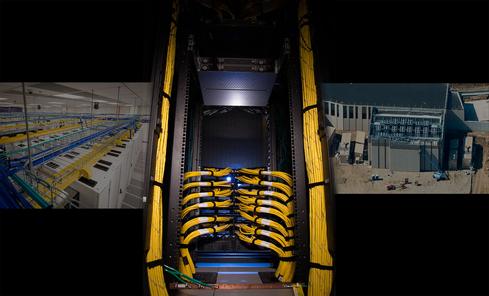VMware Fires Back At Amazon 'Import Portal'VMware Fires Back At Amazon 'Import Portal'
Amazon threatens VMware turf with a new Connector and Import Portal. VMware's response: Not true hybrid cloud.


6 Models Of The Modern Data Center
6 Models Of The Modern Data Center (Click image for larger view and slideshow.)
It didn't take VMware long to respond to Amazon's incursion into the vCenter data center management console. CTO for the Americas Chris Wolf, VMware's January recruit from the Gartner Group, answered Monday in a blog post.
In "Don't Be Fooled By Import Tools Disguised As Hybrid Cloud Management" Wolf wrote plenty to support his headline. It's nothing new for one hypervisor supplier to build a means of converting some other hypervisor's virtual machines to its own format, Wolf noted. Amazon previously had that capability for VMware ESX Server VMs, and VMware itself has built an ability to convert Microsoft Hyper-V virtual machines into those that can be managed with vSphere management tools. But the key passage that illustrates how VMware will resist Amazon raids on its customer strongholds was:
The true challenge is trying to manage workloads deployed to different data center or cloud environments requiring new API integration or new operational management tooling. IT decision makers want a consistent management and QA experience no matter where they deploy a workload.
If you've already got a consistent set of APIs, and you're already using a sophisticated tool, such as vCenter Log Insight, why would you give that advantage up by moving to Amazon Web Services? You'd lose the ability to know in detail what your workload is doing or to predict what capacity to assign for consistent operation, Wolf suggested.
[Want to learn more about Amazon's bid for VMware-based virtual machines? See Amazon Opens On-Ramp For VMware Workloads.]
Wolf said he talks to plenty of customers, and a common complaint is that once they've set up tasks in the public cloud, they're dismayed to find they "cannot be redeployed or migrated anywhere else." While it might be technically possible to do so, there's "always a matter of migration costs outweighing the benefits." Private enterprise often has to meet security and compliance requirements, or distribute a key production software stack to different locations around the world. One public cloud provider won't get them to where they want to go.
"The organizations that I speak with daily are demanding the following... Flexibility and choice. Today's platform decision may not be the best option in two years, or perhaps even a few months," he wrote.
"When you get past the marketing," he continued, without saying whose marketing, "...converting the virtual machine, migrating the app and the data is the easy part. Rebuilding the management infrastructure is anything but 'easy.' " Trying to provide similar management with different and perhaps more limited tools in a new environment can be something like a game of Jenga, he warned. Take away one management dependency, "and the whole service stack can come tumbling down."
Given that moving workloads is something of a Jenga contest, the enterprise architects of hybrid cloud "want as few variables as possible," and that means both host hypervisors and management tools. The more involved, "the more costly automation becomes at scale."
In the second half of the blog, Wolf points to Amazon's May 30 announcement of AWS Portal for vCenter and AWS Connector for vCenter. The portal can be used for importing a VMware virtual machine into EC2 and conducting basic management tasks, conceded Wolf. But he raised the following objections to VMware customers actually using it:
There is no easy way to move workloads back to one of your data centers, or to another cloud provider
You cannot use your existing software licenses
You cannot automate and orchestrate across private and public clouds
You cannot enforce policy governance across multi-clouds
You lose all of the seamless third party integrations deployed through the VMware Solution Exchange
[The exchange is where both it and third parties, such as HP, ExtraHop Networks, Hytrust, and VCE, offer management packs for specific purposes.]
"There are many things that the AWS Management Portal does not do that should lead you to question its strategic value," Wolf wrote.
Private clouds are moving rapidly from concept to production. But some fears about expertise and integration still linger. Also in the Private Clouds Step Up issue of information: The public cloud and the steam engine have more in common than you might think. (Free registration required.)
About the Author
You May Also Like






